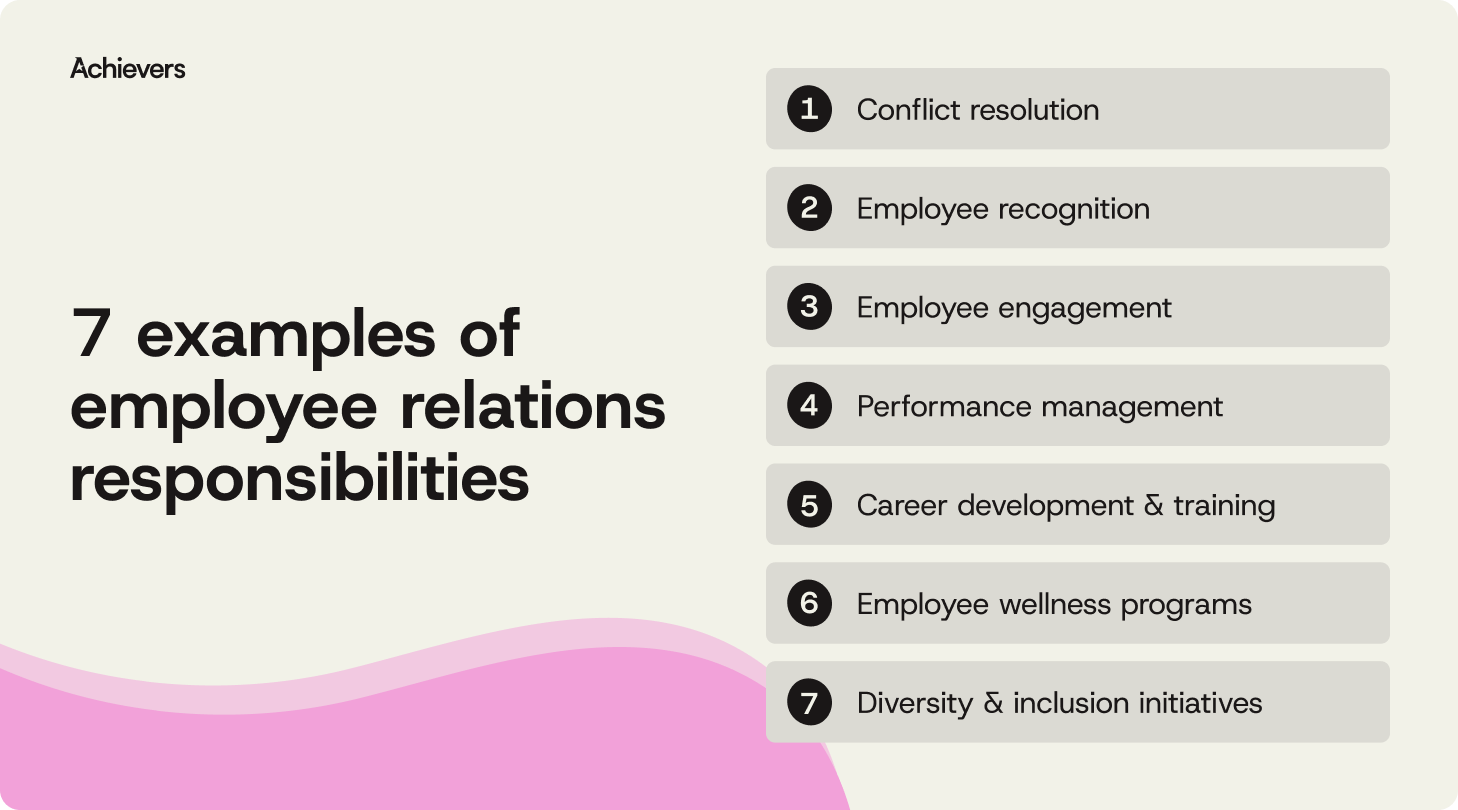Table of contents
Create a culture that means business™
Schedule a demo with an Achievers solution expert today.
Employee relations can feel like a catch-all term — but at its core, it’s about one thing: how people experience work, every day. It’s the conversations between managers and their teams. It’s how feedback is given (or not). It’s whether employees feel heard, supported, and recognized for what they bring.
When those relationships are strong, everything else gets easier — engagement climbs, turnover drops, and trust in leadership grows. But when they’re weak? It shows. 51% of U.S. employees are either looking for or actively seeking a new job.
So how do you ensure employee relations is more than a once-a-year strategy slide? Let’s start with the seven responsibilities that shape it day to day.
7 employee relations responsibilities every HR leader should own
Every policy, conversation, and feedback loop contributes to how people feel at work. And when those relationships are built on trust, fairness, and recognition, the impact shows up across the board — in culture, performance, and retention.
HR teams have the power to shape those relationships every day. Here are seven responsibilities to own with intention — and how they help build a workplace people want to be part of.

1. Conflict resolution
Tension is normal. What matters is how it’s handled. HR’s job is to create a workplace where issues don’t fester — they get addressed, head-on and with care.
Key responsibilities:
- Stay neutral and lead with empathy — every voice needs to be heard
- Help teams talk it out through open conversations or structured mediation
- Create a clear, safe process for raising and resolving issues
- Set the tone for a culture where feedback is welcomed, not avoided
2. Employee recognition
A thank-you at the right moment can shift someone’s whole day — and over time, shape your entire culture. Recognition drives connection, trust, psychological safety, and a sense of purpose.
Key responsibilities:
- Make recognition easy and frequent with the right tools
- Build both manager-driven and peer-to-peer recognition into daily workflows
- Tie recognition to behaviors that reinforce culture and business goals
- Watch for gaps in participation — they often signal disengagement
3. Employee engagement
Engagement is your early-warning system. When it dips, it’s usually not about perks — it’s about unmet needs, unclear expectations, or relationships that need rebuilding.
Key responsibilities:
- Use pulse surveys to stay ahead of potential issues
- Dig into trends by team, role, and manager to spot what’s working (and what’s not)
- Close the loop — communicate what you heard and what’s changing
- Keep engagement visible across the org, not siloed in HR
4. Performance management
When done right, performance conversations build clarity, trust, and growth. When done poorly (or not at all), they break confidence and motivation.
Key responsibilities:
- Move beyond annual reviews — support regular, forward-looking feedback
- Train managers to focus on strengths, clarity, and two-way dialogue
- Connect recognition and feedback to support continuous growth
- Use performance data to guide development, not just ratings
5. Career development and training
No one wants to feel stuck. When employees don’t see room to grow, frustration and disengagement creep in — and that tension impacts relationships across the board. Tools that support internal mobility and personalized learning go a long way.
Key responsibilities:
- Map development opportunities to both business goals and employee ambitions
- Make internal mobility visible and achievable
- Support growth conversations between managers and employees
- Track program usage and impact to evolve your learning strategy
6. Employee wellness programs
If employees are burned out, overwhelmed, or unsupported, it doesn’t just affect performance. It affects how they show up with each other. When people feel supported in managing stress, balance, and mental health, they show up with more clarity, empathy, and connection.
Key responsibilities:
- Offer flexible, accessible support for mental, physical, and emotional well-being
- Normalize use — from PTO to mental health days — through consistent messaging
- Tailor programs to the needs of different teams and working styles
- Treat well-being as a team norm, not an individual responsibility
7. Diversity and inclusion initiatives
Belonging is a key ingredient in any healthy work culture — and it doesn’t happen by accident. Strong employee relations depend on an environment where every employee feels safe, seen, and respected. That’s why DEI work has to be ongoing and visible.
Key responsibilities:
- Run regular DEI trainings and refreshers on inclusive leadership and bias
- Support ERGs and give them visibility, budget, and executive sponsorship
- Use recognition and feedback tools to highlight inclusive behaviors
- Set measurable DEI goals and share progress openly with your workforce
Why employee relations is important
When people feel supported and respected at work, they’re more likely to be their best selves and do their best work. That’s the power of strong employee relations — it fuels connection, trust, and drives those key business results.
Here’s what it can unlock:
- Higher engagement and morale: Feeling seen shouldn’t be rare — and when it’s not, motivation follows. Employees who feel recognized at least monthly are more than twice as likely to say their company cares about their well-being, according to Achievers Workforce Institute (AWI). That kind of trust? It shows up in how people work — and who they choose to work for.
- Lower turnover and stronger retention: People leave when they feel ignored or undervalued — not when they’re growing and heard. Strong employee relations make it harder for competitors to poach your best people, and easier to keep your culture intact when things get tough.
- Better performance and productivity: Teams don’t just need goals — they need trust, clarity, and room to think. When employee relations are strong, people stop wasting energy on workplace politics and start focusing on real results.
- Improved business reputation: How you treat people doesn’t stay behind closed doors. Great employee relations signal to candidates, customers, and current employees that your company walks the talk — not just when it’s easy, but when it counts. That kind of credibility travels fast.
- A stronger, values-driven culture: You can’t build culture with a poster campaign. It’s built through everyday moments — how people recognize one another, how leaders listen, how feedback gets handled. And that all comes down to how you manage relationships at work.
The business case for investing in employee relations
Strong employee relations show up in the metrics that matter — engagement, retention, performance, and culture health. When people feel respected and supported, they’re more likely to stay, contribute, and grow. And when they don’t, the impact is just as visible.
Here’s what’s at stake:
- Engagement and motivation: People are more committed to their work — and their teams — when recognition, trust, and two-way communication are part of the culture.
- Retention and cost savings: Poor employee relations lead to preventable turnover. And with the cost of replacing an employee often exceeding 1.5x their salary, that’s not a hit most teams can afford.
- Productivity and performance: When people feel genuinely appreciated, they bring their best. In fact, AWI data tells us that 84% of employees who are meaningfully recognized at least monthly say they’re performing at their most productive.
- Reputation and risk reduction: Fair processes and strong relationships reduce the likelihood of conflicts escalating — and protect your employer brand in the process.
Make employee relations your retention advantage
Most people don’t leave because of the work — they leave because of how the work feels. The tone of a tough conversation, the silence after a big win, the way feedback lands (or doesn’t). These everyday moments shape the employee experience — and they add up fast.
At Achievers, we help HR leaders turn those moments into something better. With tools that make recognition, feedback, and communication easy and consistent, we empower organizations to build real connection. When people feel seen, heard, and valued, they don’t just stay — they thrive.



